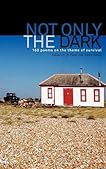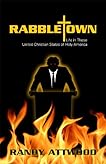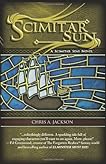 Zombie Church: Breathing Life Back into the Body of Christ
Zombie Church: Breathing Life Back into the Body of Christ by
Tyler Edwards
My rating:
5 of 5 stars
Don't be a zombie, church! We've all seen them—those churches filled with mindless, murmuring zombies. But wait! Not only have we
seen them, but chances are most of us
are or
have been apathetic, uninspired, uninvolved, uncommitted churchgoers... the living dead. In
Zombie Church: Breathing Life Back into the Body of Christ, Tyler Edwards shows how those countless B-grade zombie flicks mirror the symptoms of the silent, creeping spiritual sickness that infects churches throughout America.
I'm not a fan of vampires, werewolves, or zombies. I admit that this book falls well outside the boundaries of what I normally read. But, I' m fairly confident the author's zombie parallel falls well outside the boundaries of what pastors and church leaders normally write. This fresh perspective and Edwards' spot-on analysis of
what ails the church provides for a reading experience that is enjoyable, inspiring, and thought-provoking. With arguments based in logic, observation, and scripture, the author offers his comparisons, and it is inevitable that we, as readers, find ourselves identifying with the examples set forth. As the author leads us through his book, pointing out these zombie-like behaviors and challenging us to open our eyes, it is only natural for our personal thoughts to surface—thoughts which begin in the early chapters with, “
Oh, I've seen that guy,” or “
Yeah, they never do anything at the church,”—and, as we read on, thoughts which become, “
Oh, that's me,” or “
I need to make a commitment.”
I've read many books that were better written, but I've seen precious few that contain such a profoundly important message. While many Christian writings become structured, academic diatribes with the aim of "guilting us" into being good Christians, the author's style here remains casual, contemporary, and accessible—it offers us hope that we can be good Christians—a stylistic choice that serves well in this case. That said, if you are only interested in style, grammar, punctuation, and the like, then
Zombie Church is probably not the book for you. However, for myself and the rest of humanity,
Zombie Church is a fascinating and eye-opening study of the spiritual disease afflicting our church today. Thankfully, the author is not content with diagnosis, though, as he offers the cure.
In
Zombie Church, Tyler Edwards outlines what our church is and reminds us what it
should be. He explains that many of us have become spiritual zombies, and he gives us the tools needed to recognize and correct our zombie behaviors. He also helps us onto the path toward enriching our hearts, minds, and souls through a relationship with Jesus Christ—which, in turn, is the antidote that can and will restore life and health to our church.
If, after reading
Zombie Church, you don't wonder if you're a zombie yourself then perhaps you're no longer one of the living dead, but are truly dead. Read
Zombie Church and don't be a zombie, church!
View all my reviews
[Note: I received my copy of Zombie Church from Litfuse in exchange for being part of their blog tour. The tour schedule, purchase link, author bio, and giveaway info below are from Litfuse, as well.]
Blog Tour Schedule: http://litfusegroup.com/blogtours/text/13424384
To purchase the book on Amazon:
Zombie Church
About the author of Zombie Church: Tyler Edwards is the lead pastor at Cornerstone Christian Church in Joplin, Missouri, where he works to help people learn how to live like Jesus, love like Jesus, and look like Jesus—so they carry out the mission of Jesus to the world. He graduated from Ozark Christian College with bachelor’s degrees in both Biblical Literature and Christian Ministry. He has written articles for Lookout Magazine, spoken at various campus ministry events in Missouri, and served overseas in Mbale, Uganda. Tyler loves cheesy horror films. He is particularly fond of movies like
Dawn of the Dead,
The Signal, and
28 Days Later, where zombies run wild and threaten to infect an entire town.
Giveaway: The publisher is giving away a $50 gift card for Amazon to one person through this blog tour.
To enter all you have to do is send a tweet (using @litfuse) about Zombie Church or share about it on Facebook! If you tweet we'll capture your entry when you use @litfuse. If you share it on Facebook or your blog, just email us and let us know (info@litfusegroup.com). Easy.
Not sure what to tweet/post? Here's an idea:
TWEET THIS: Zombie Church by Tyler Edwards - a fair-minded & tenderhearted critique of the church http://ow.ly/6Nv05 @litfuse RT for $50 to @amazon
FACEBOOK THIS: Don’t miss Edwards - a fair-minded and tenderhearted critique of the church. http://litfusegroup.com/blogtours/text/13424384 Written for the discouraged, disenfranchised, and anyone unsatisfied with their same-old church routine, Zombie Church challenges readers to turn away from hollow religious practices, which characterize “zombie Christianity,” and turn toward a radical relationship with Jesus. Share this for a chance at $50 to Amazon.com.
 Not Only the Dark: 160 Poems on the Theme of Survival by Jo Field
Not Only the Dark: 160 Poems on the Theme of Survival by Jo Field






















